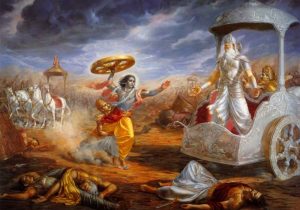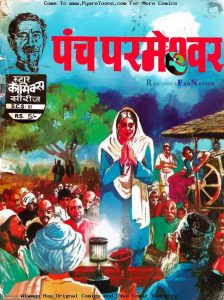Mediation has been in use way before than we can imagine.
Get ready to be surprised.
Consisting of over 100,000 shloka or over 200,000 individual verse lines (each shloka is a couplet), and often termed as the “The longest poem ever written“; this is a book that many Indians live by.
Mahabharata, gives one too many lessons on what lawyers like to swear by, i.e. “justice, equity and good faith“. It leaves an indelible impact on the person reading it, informing about fundamental life lessons (Read some of the most important ones here) Words would fall short for explaining what an important position it holds in our society.

One of the lesser noticed lessons that it teaches is: Mediation. We’ll be focusing on this vital case in which God himself was the mediator
CASE NAME:
Pandavas
vs.
Kauravas
Mediator’s Name: Lord Krishna
Status: Mediation Failed ( Battle of Kurukshetra ensued).
Nobody can escape Lord Krishna’s charm. Wearing a peacock feather in his long black hair, while playing out of the world melodies on his flute, Krishna was a pleasure to the eyes. The “natkhat” could woo hearts without a hitch. However, not many notice his role as a mediator in the battle of Mahabharata.
The Chief Justice of India, T.S Thakur said in a recent conference that mediation was also popular in Indian mythology (Read here). In the Mahabharata, when the Kauravas and the Pandavas were fighting, Lord Krishna became the mediator. This shows us that mechanisms like these have been there since time immemorial. The (failed) mediation by God himself gives us a few lessons to learn:
1) To Mediate is A Divine Function
Mediation, or being the deciding party in a case, is nothing less equivalent to being a deity. Such a power is reposed in them which is no less than God’s. Non-judgmental acceptance of every human being is a critical and practical tool in mediation. Most religions and spiritual practices advocate a non-judgmental approach. The Vipassana meditation is about observing oneself and others without judging. Jesus Christ in the Sermon on the Mount says “Do not Judge”.
A Mediator knows that he/she will never get to know the entire truth and many things would still be unclear in the conflict. He is not guided by the Civil Procedure Code and the Evidence Act and so he does not have any means to establish the truth. He does not have to form opinions nor is required to render any decision. He has to take humans as they are, laden with all their shortcomings and strengths which co-exists in all human beings. He only needs to facilitate the discussion so that all the cards are laid down on the table.
Even His Holiness Dalai Lama opines- “Now, there are many, many people in the world, but relatively few with whom we interact, and even fewer who cause us problems. So, when you come across such a chance for practicing patience and tolerance, you should treat it with gratitude. It is rare. Just as having found a treasure in your own house, you should be happy and grateful to your enemy for providing that precious opportunity” This is precisely the role mediators play in one’s life.
The mediators become instruments of peace and develop within them a peaceful attitude towards life. Even the Bible says “Blessed are the Peace Makers, they shall be called children of God “, or in Mahabharata’s case, the mediator may be God himself.
One of the best story writers of India, Munshi Premchand, depicted this beautifully in his story Panch Parmeshwar. The story explores the concept of justice, the sanctity of the seat of justice, which is represented by the Panchayat of the village in the story. The Panch is invested with a spark of divinity when they are given the power. The story explores human sentiments and the failed attempt by one of the characters to avenge a previously held grudge when appointed as the judge in a case. Being in a judge’s position, the person understood how the position exalts an individual and ultimately rendered the judgment in an equitable fashion.
Humans are capable of being cruel, biased and unjust. However, when the same humans are vested with such a big position, they tend to forget the latter and do justice.
2) Not all Mediations Are Successful
What better way to understand this than by taking the example of Krishna. Despite trying with all this might, he wasn’t able to resolve the differences. Letting the parties take their own choice but nonetheless facilitating their negotiation was the quixotic act of diplomacy taken by anyone. However, it all failed! This tells us that people should not be disheartened when a process does not yield the intended outcome, but should look for better things to come in life.
And consequently,
3) The Ones Not Seeking Peace Are Vanquished
The last lesson that Mahabharata teaches us is that one should always strive to make peace and not be hard-nosed. The plight of Kauravas after the battle of Kurukshetra is well known by everyone. Therefore, it is always better to make amends when the time is right and not regret it later.
Lastly, Mediation gives the parties a fresh perspective to the case. This compels the parties to ponder upon their dispute at hand and the recourses available to them. He helps them reflect upon things which previously might not have been thought by the parties. A glass seen as half empty might now be seen as half full after a riveting mediation session. As Stephen Covey also suggests, one of the greatest traits an individual can have is the ability to convert any situation to a win-win one and that is precisely what mediators do. The settlement reached is such that all parties go home happy.
This is a real life experience of one of the mediators in Bangalore who works in the Centre For Advanced Mediation Practice (CAMP), Bangalore.
“In a case I mediated, five brothers got into bitter litigation over their father’s will and the partition of the business he had left them. During the course of the litigation, two of them died (possibly due to the strain of litigation) and finally they came in for Mediation. At an impasse, everybody looked to me for direction. Nobody was willing to move from their respective fixed positions. What I would say or do next, would determine if the Mediation would move forward or not. We were at a crossroad and I had to do something. With a prayer, I got them to list down the names of all the members in their respective families including their departed mother and father adding up to thirty-eight members. Each of the three brothers were then asked to reflect upon the stress litigation had caused to their family members, the resultant ill-health, negative impact on their businesses, expenses involved, continuing strained relationships between each of them, loss of good times their families could have had with each other, the loss of honor to their departed parents etc. It was a powerful moment for the three of them to come to a realization of the adverse impact of their actions and the sad consequences on lives that were most precious to them. This helped to shift perspectives and the impasse broke. The dispute eventually settled.” (Read the entire article here).
There is no denial that it is a sacred moment or a moment of grace in mediation when parties loosen the tight knot in their perspectives and mediators are privileged to be the catalysts in that shift.
Give it a try?
Happy Mediating!
(This blog post is inspired by a speech delivered by the Hon’ble Chief Justice of India Mr. T.S. Thakur in his inaugural address at the international conference ‘Arbitration in the era of globalisation’ organised by the Indian Council of Arbitration and business chamber FICCI. Read more about it here).





